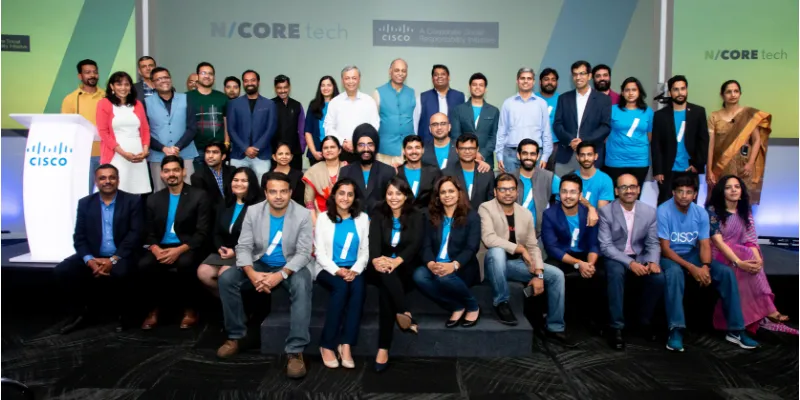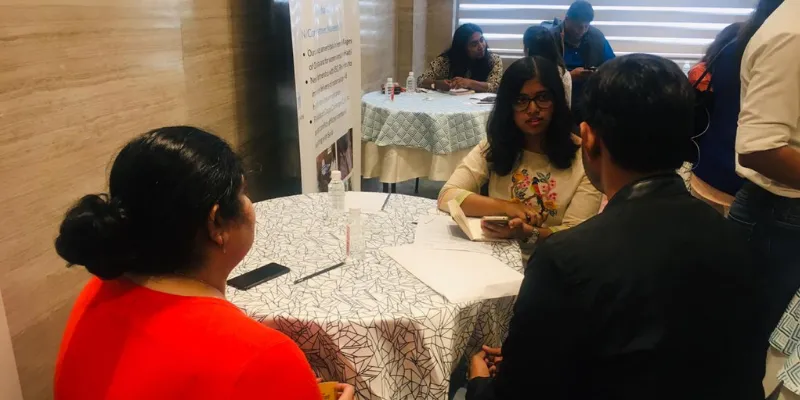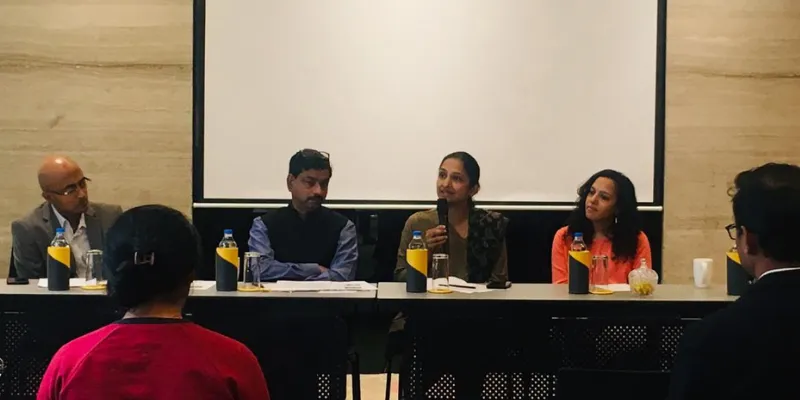Meet the 8 tech non-profits working to solve real-life problems and improve people’s lives
The eight non-profits chosen for the first N/Core-Cisco tech incubator are using technology to resolve problems in the fields of healthcare, education, sanitation, water, and urban governance.
“Technology for good” is a much-bandied-about phrase these days, but how does it translate into work on the ground? A few Indian non-profits are showing the way by using technology to resolve real-life problems in the fields of healthcare, education, sanitation, water, and urban governance.
Eight such non-profits recently graduated from tech incubator N/Core and Cisco’s inaugural cohort. They were selected from over 700 applicants, and were part of a six-month programme that included an innovation grant of Rs 10 lakh.

The non-profits that made it to the inaugural cohort were Involve Education, Alohomora Education, Pi Jam Foundation, Samagra Foundation, Lakeer Foundation, Intelehealth, Aquasafi Rural Development Foundation, and Change with One Foundation.
Selected founders were mentored by leaders like Sanjay Purohit, ex-Chairman of Infosys Consulting; Maneesh Dhir, former MD of Apple India; K R Lakshminaraya, Chief Endowment Officer of Azim Premji Foundation; Ujwal Thakar, ex-CEO of Pratham and GiveIndia; S K Jain, Co-founder of WestBridge Capital; Madhav Chavan, Founder of Pratham; and Kamakshi Rao, formerly Senior VP at Capital. The non-profits were also mapped to technology leaders at Cisco for technology-specific mentoring to scale their solutions.
Here's a closer look at the eight non-profits:
1. Lakeer Foundation - Civic intelligence platform
Hyderabad-based Lakeer Foundation is a civic intelligence platform that aims to make cities more equitable. Founded by Dipika Kumar and Varun Pawar, the non-profit is focusing on improving the quality of life in Indian cities.
The team at Lakeer is spearheaded by a team of specialists in poverty alleviation, public policy, urban planning, and technology, says Varun, 29.
We have built a geospatial city intelligence tool, CitySight, which helps city administrators make more informed decisions around where to use their budgets and resources in a citizen-centric way, he adds.
The non-profit is currently working in partnership with the Government of Telangana on issues such as mobility, disaster resilience, environmental sustainability, and pro-poor services.
Lakeer is also one of the 10 non-profits selected by Telangana to be mentored and partner with the government.
2. Alohomora Education Foundation - Tech for life choices
Founded in 205, Delhi-based Alohomora Education Foundation focusing on building self-belief, exposure, and skills in young adults to enable them to make interest-aligned career choices. Divakar Sankhla and Parinita Jain, Teach for India alumni, are already working with 1,500 students of Class XI and XII across 16 government schools in Delhi and Gurugram.
The non-profit uses technology to let students to become independent learners and help develop their confidence to make informed life choices.
In 2016, Alohomora Education Foundation was one of the top 6 ideas selected globally at the World Bank Youth Summit.

3. Intelehealth – Last-mile primary healthcare
Focused on improving access to primary healthcare in underserved regions of the world, Intelehealth is a tech non-profit based out of Mumbai.
Neha Goel, the 29-year-old founder, says,
It is extremely unfair that poor people in rural areas have to pay a poverty premium to access healthcare. The first barrier is to reach the hospital itself; then come problems of access to best infrastructure, language barrier, and so on. We wanted to solve the problem of doctor-patient consultation time. Our tech platform is a low-bandwidth app that can be integrated in a basic mobile phone. The expert system knowledge app guides health workers to questions relevant to the patient.
The two-year-old company partners with health organisations to set up high-quality primary health programmes. The delivery model enables community health workers (CHWs) to provide essential components needed at the first point of contact with the health system access. This is done through a combination of open source technology, training, and implementation support with a novel knowledge engine (HxGuide) at the core. “This empowers CHWs with tools for comprehensive primary healthcare delivery in last-mile settings.”
4. Aquasafi Rural Development Foundation – Helping villages, one drop at a time
Keen to make villages self-reliant for their drinking water needs, Aquasafi Rural Development Foundation is working with unserved communities. The Hubli-based non-profit partners with panchayats to operate and maintain drinking water stores, which are automated, and provide 20 litres of water for Rs 2 (24x7). The machinery is controlled using IoT devices, and data is uploaded to the cloud through SMS gateway. Surplus money earned from the store is used for watershed development activities in the village.
Founded by 28-year-old Pavin Pankajan, Aquasafi Rural Development Foundation is presently operating eight plants in Anekal Taluka, and two plants in Hubli, benefiting 15,000 people every day.
Automation reduced the operation cost by 50 percent, enabling us to provide treated water at low costs, the founder says.
5. Simply Blood - Connecting blood seekers and donors
Kiran Verma founded Delhi-based Simply Blood in 2016 to bridge the gap between blood donors and seekers. The initiative aims to make sure that nobody dies for want of blood after January 1, 2026.
The founder, a 42-time blood donor, is a school dropout and eventually left a job in marketing to start his initiative.
The tech product connects peer-to-peer blood donor to the seeker. This reduces the average time taken to four hours from 12 hours. This process also reduces the blood wastage that often occurs in these processes, Kiran says.
6. Involve Learning Solutions Foundation - Peer teaching
Founded by IIT Madras students, Involve Learning Solutions Foundation focuses on peer teaching to develop leadership skills and improve academic performance. The founders - Divanshu Kumar, Samyakth Joshi, and Avnish Kamat - are all 20-year-olds and are backed by Singapore International Foundation.
The non-profit supports 6+ hours of intervention per week to develop age-appropriate leadership in seniors and improve the academic performance of juniors. The Chennai-based company trains and mentors students in the age group 12-16. Through after-school academic support in low-income private schools, the uniquely designed tech platform offers students a quality learning ecosystem. Services are currently offered in Chennai and Bengaluru. The non-profit claims to have impacted 800+ learners, developing 150+ leaders from eight schools.

7. Pi Jam Foundation - Tech to learn and create
Founded by engineers-turned-teachers Shoaib Dar (29), Jaskaran Singh(27), and Sanjay Shenoy(30), Pi Jam Foundation equips students with tools to learn and create. The Pune-based non-profit aims to provide children and educators access to affordable technology and computer education to foster essential skills like problem-solving and design thinking.
We use affordable and open-source technology in under-resourced government and private schools. The grade-specific curriculum is specially designed for the Indian context and is at par with global standards. This enables building essential 21st-century skills in our students. Through our intervention, students build prototypes of technology-backed solutions to problems they observe in their everyday surroundings, while also applying concepts from subjects like math and science practically, Shoiab says.
The approach uses technology to teach design thinking, algorithm building, and practical applications of existing knowledge while providing an outlet for students’ creativity.
8. Samagra Empowerment Foundation - Sanitation for all
Pune-based Samagra Empowerment Foundation is working to enable the urban poor to lead healthier and dignified lives by “making sanitation accessible, affordable and aspirational”.
Samagra is currently building and deploying an IoT and AI-enabled LooGovernance platform called SmartLOO across India to ensure that the toilets built under Swachh Bharat Mission remain clean and usable for millions of urban poor for the foreseeable future. Founded by 32-year-old Swapnil Chaturvedi and Iti Mathur, the non-profit connects public toilets to municipal bodies and converts any public toilet into a “smart toilet” with sensors that collect data on access to water and other infrastructure.
I believe that the answer to wicked problems lies in the innovative use of psychology, technology, and design. We aim to impact the lives of 100 million urban poor in the next five years, Swapnil says.
The eight non-profits will demonstrate their solutions at Soiree, the graduation demo day, to a diverse audience comprising business and CSR leaders, philanthropists, impact investors, and Cisco’s leadership in India.
Priya Ajmera, Director of N/Core Tech, said,
Innovation, Scale and Speed are the core values of N/Core. The distance covered by our entrepreneurs over the past few months is evidence of their commitment to solving problems at scale, with a sense of urgency.

Speaking on the collaboration between the two industry bodies, Harish Krishnan, Managing Director, Public Affairs and Strategic Engagements, Cisco India, said,
Our collaboration with N/Core is focused on building a generation of problem solvers who harness the power of technology to tackle social problems at scale. Each entrepreneur of this cohort has creatively used technology to transform promising ideas into reality. We are excited at the possibilities that these solutions can address.
He added that this partnership was aligned with Cisco’s global vision of impacting 1 billion lives worldwide by 2025. This collaboration will be redirected to create a robust ecosystem, including government and community organisations in India, to effect real change in areas of critical human needs, education, economic empowerment, and environmental sustainability.







